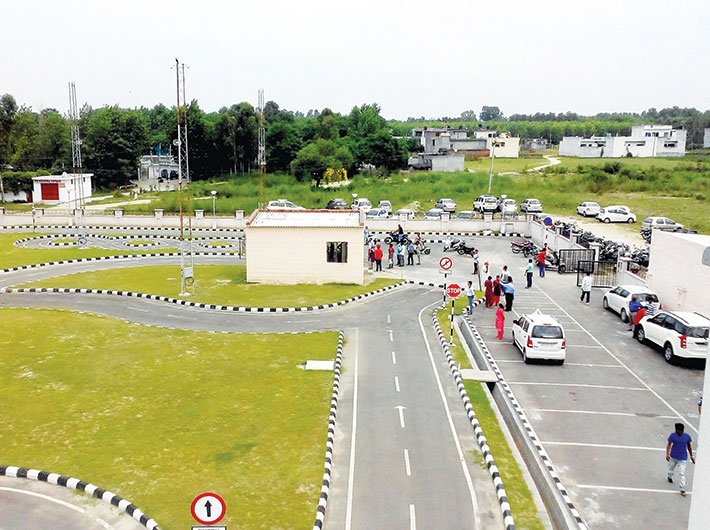Punjab is on the way to become the first state to have fully automated driving test tracks.This means users can get the driving licence within an hour of clearing the test
Thirty-year-old Prince Bagla from Hoshiarpur in Punjab couldn’t contain his excitement when he received his driving licence on the very day he had applied for it. He didn’t have to go through the routine drill of approaching an agent, paying bribes to officials and endlessly waiting for days to receive the licence. “It was simple. I filled and submitted the form; took the test and received my licence on the same day. So why do we need an agent and pay more than the official fee now,” says Bagla. This was possible due to the overhauling of the driving test facility in Hoshiarpur district.
In April, the Punjab government inaugurated the Automated Driving Test Centre in Hoshiarpur. Spread across an acre of land, the centre has separate tracks to conduct driving tests for two-wheeler and four-wheeler private vehicles. The fee for applying for the licence is Rs 250. End-to-end services are provided to the citizens of Hoshiarpur district at this centre, which include applying for the licence, driving test, medical check-up and issuance of driving licence card.
As the name of the centre suggests, driving tests here are invigilated and monitored by sensors, without any human intervention. Seven towers, equipped with cameras and sensors, are spread across the neatly carved-out tracks. These towers oversee the performance of a driver and showcase the result on a computer at the end of a test. The driving skill of a candidate is evaluated on the basis of parameters defined by the state government.
To get a permanent driving licence for a four-wheeler, a candidate has to drive through a small hill. Maneuvering the vehicle through the ‘S-shaped’ and ‘8-shaped’ tracks, the candidate then has to park the car without letting its wheels touch the white lines drawn on the sides of the tracks. All this, while the sensors monitor the candidate’s performance and flash a ‘no objection’ pop-up on the computer screen if he/she passes the driving test. After clearing the test, the candidate will receive his/her driving licence in just 40 minutes.
There are a total of 32 driving test centres across Punjab, out of which 28 have automated driving test tracks. The remaining will be automated by September. This will make Punjab the first state in the country to have fully automated driving test tracks.
The automated system is not only helping in reducing the middlemen network in the state but is also bringing transparency into the whole system of issuing licences and promoting trained drivers to curb road accidents. Explaining this further, Darbara Singh Randhawa, district transport officer (DTO), Hoshiarpur, says, “Before the automated system, more than 100 permanent driving licences were issued per day.
Now the number has reduced to 50. There is more strictness now, and no licence is issued unless a candidate clears the test.”
So far the state government conducts automated tests only for private vehicle drivers. In future it is planning to put commercial vehicle drivers under its ambit too. “The Punjab government is planning to build automated tracks in four locations across the state where drivers of commercial vehicles will be provided training,” says Randhawa.
The total cost to build 32 automated driving centres in the state is Rs 64 crore, out of which the state government has invested Rs 45 crore for infrastructure. For developing technology for this system, the government has roped in SmartChip Private Limited – a subsidiary of Safran Identity and Security. The France-based technology group will provide end-to-end service to the state transport department including manpower, hardware and software, conducting tests and printing driving licence cards.
“We piloted the project in May 2015 for eight months in Bathinda. After that the government decided to implement it in one go across the state,” says Atish Gupta, project head for Punjab, SmartChip.
Enumerating some of the benefits of this system, Gupta says, “It is giving strength to the road safety. Earlier, tests were conducted manually and no records were maintained.” No data was maintained about the official who had conducted a particular test, which led to a lot of tampering. “We are monitoring the tests on the basis of video analysis technology. These videos are saved and can be viewed anytime, even by a candidate. The videos are stored in a central server of the state transport office,” he adds.
Apart from Punjab, SmartChip is also working with seven other state governments – Odisha, Madhya Pradesh, Bihar, Chhattisgarh, Gujarat, Goa and West Bengal.
Speed breakers
While the government has automated driving tests and has eased the process of issuing licences, the process for application is still manual.
Feeling frustrated while filling lengthy and multi-page forms, Harnek Singh, a 35-year-old resident of Hoshiarpur district, says, “It took me more than two hours to fill forms and submit them. The form handling process is not satisfying.”
Gupta from SmartChip says that the company will soon go online for the process of application and payment. “We are also in the process of introducing biometric verification for identification of applicants. This will keep a check if the same person who has applied for the licence is taking the test, and not a proxy candidate.”
Harnek Singh was not able to clear his driving test and blamed it on the officials. “I am giving the test for the first time. There was no one to guide me,” he says, highlighting lack of assistance by the staff for the first-time test-givers. However, he can appear for the test again after a gap of 10 days, following the same procedure.
Despite a few speed breakers, the state government has been successful in making the whole process easy and hassle-free. The technology-driven system will ensure drivers on roads are trained and that will reduce accidents. It will also eliminate data tampering that was happening due to the wide-spread network of agents and touts. It is now to be seen how other states take forward this project.
[email protected]
(The article appears in the September 1-15, 2016 issue)



